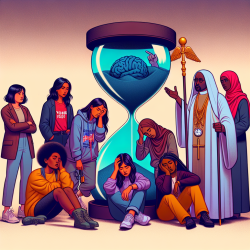Understanding Burnout Among Women of Color Activists
In the realm of racial justice activism, burnout is a persistent and pervasive issue, particularly for Women of Color (WOC). The challenges faced by these activists are multifaceted, often exacerbated by the intersectionality of their identities. The research article "Racial Justice Activist Burnout of Women of Color in the United States: Practical Tools for Counselor Intervention" provides a comprehensive overview of these challenges and offers practical tools for counselors to intervene effectively.
The Components of Activist Burnout
Activist burnout is not a monolithic experience; it is comprised of internal, external, and in-movement components. Internally, activists often grapple with self-induced pressures and the overwhelming magnitude of systemic change required. Externally, they face threats ranging from harassment to physical violence. Within movements, interpersonal conflicts and experiences of racism and sexism can further exacerbate burnout.
Psychosocial Stressors and Health Impacts
WOC activists face unique psychosocial stressors, such as racial battle fatigue and a culture of selflessness, which can lead to severe physical and mental health issues. These stressors often manifest as chronic health conditions, depression, and compassion fatigue. The cumulative impact of these stressors necessitates targeted interventions to support the well-being of WOC activists.
Practical Tools for Counselor Intervention
Counselors play a pivotal role in addressing burnout among WOC activists. The research outlines several empirically supported interventions:
- Psychoeducation: Educating activists about burnout and its symptoms can empower them to recognize and address these issues early.
- Mindfulness and Relaxation Techniques: Practices such as mindfulness and deep breathing can help activists manage stress and emotional exhaustion.
- Dialectical Behavior Therapy (DBT): This therapy can aid in managing difficult emotions through mindfulness, helping activists find a balance between emotion and rationality.
Barriers to Seeking Help
Despite the availability of these tools, WOC activists often face barriers to accessing mental health support. Cultural norms, financial constraints, and a lack of culturally competent counselors can deter them from seeking help. Counselors must be proactive in creating accessible and culturally sensitive interventions.
Conclusion
Burnout among WOC activists is a significant concern that can impede the progress of social justice movements. By understanding the unique challenges faced by these activists and implementing practical counseling interventions, counselors can play a crucial role in sustaining their well-being and the momentum of their work.
To read the original research paper, please follow this link: Racial Justice Activist Burnout of Women of Color in the United States: Practical Tools for Counselor Intervention.










